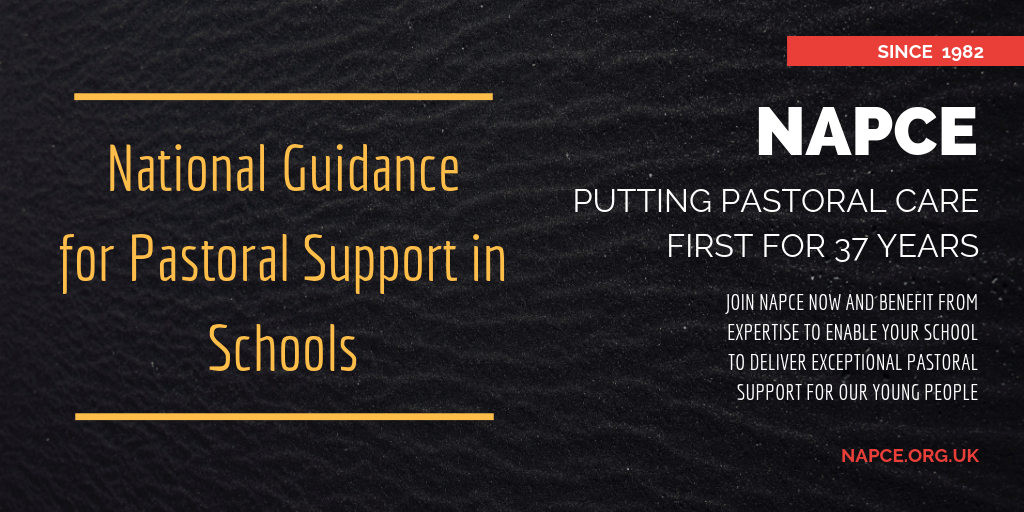For 37 years the National Association or Pastoral Care in Education has been leading the discussion on pastoral care in schools across the UK and further afield.
We are now pleased to release our latest National Guidance (2018) document to deliver a clear framework for professionals working in pastoral care across the education sector.
Pastoral Leadership
Effective pastoral leadership with a clear purpose and direction
- Develops an ethos which promotes learning, academic achievement and personal development.
- Encourages learning experiences that meet the needs and raises the aspirations of learners.
- Establishes clear goals for supporting the academic progress and personal development of learners.
- Provides opportunities for learners to develop social skills and personal qualities to prepare them for their future lives.
- Implements guidance and support strategies to raise achievement
- Evaluates how effective pastoral support is and plans actions to improve provision.
- Plan and provides appropriate training and professional development opportunities for staff engaged in pastoral support.
- Manages the provision of high-quality tutoring to encourage and motivate learners to achieve their full potential.
- Implements pastoral systems to identify barriers to learning and appropriate strategies to overcome them.
- Develops effective communication between all parties involved in the education of learners.
- Provides a safe and stimulating learning environment that supports the personal development of all learners.
- Ensures early intervention and support for individual learners when it is required.
Pastoral Outcomes
Achieves pastoral outcomes that support and promote learning
- Learners are motivated to improve their knowledge, understanding and skills in relation to prior attainment.
- Learners through their behaviours and attitudes, contribute to establishing a positive environment for learning.
- Learners understand how they can be effective learners, make good academic progress and promote their own personal development and welfare.
- Learners take advantage of opportunities and learning experiences provided by the school and they are enthusiastic about learning and positive about their academic achievement and personal development.
- Learners are confident about responding to challenges they face in their education.
- Learners can work effectively with other people and are developing the skills needed for future employability.
- Learners know how to access support to enable them to achieve their full potential.
Effective Pastoral Teams
Develop pastoral systems and structures that ensures a shared commitment to supporting learners in their education, personal development and well – being.
- Have a common purpose to support learners in achieving their full potential.
- Understands the needs of learners and how to ensure an appropriate balance between challenge and support.
- Develops effective links between all staff and other professionals who contribute to the education of individual learners.
- Are involved in the development and evaluation of pastoral systems and strategies to meet the needs of all learners.
- Demonstrate and promote an enthusiasm for learning which inspires and motivates learners.
- Develop a culture with high expectations for achievement and an awareness of the importance of well – being.
- Through effective tutoring and guidance, challenge learners to achieve their full potential in their academic progress and personal development.
- Form effective partnerships with parents and carers to support learners in their academic progress and personal development.
- Are aware of appropriate resources and contacts to support learners
- Recognise and celebrate the achievements of individuals and groups of learners and use these opportunities to motivate all learners.
- Use sanctions and rewards to reinforce expectations of all learners and provide clear boundaries to ensure a safe learning environment.
- Support the academic progress and personal development of learners by using available data and evidence to inform tutoring and guidance.
Skills, Knowledge and Understanding of Staff
Staff have the knowledge, skills and understanding to be effective in providing a positive learning environment and effective support for learners, to enable them to take full advantage of the opportunities provided by their education.
- Take responsibility for remaining fully informed about developments in pastoral care and in education that have an impact on the support of learners in school.
- Have a clear knowledge and understanding of the requirements of safeguarding.
- Are aware of the statutory and non – statutory requirements for pastoral support in areas such as attendance and careers.
- Are aware of how tutoring and providing guidance supports learners.
- Know how to develop learners key skills and promote spiritual, moral, cultural, mental and physical development.
- Know how to prepare learners for the opportunities, responsibilities and experiences of adult life.
- Know how to support learners in developing the knowledge and understanding to keep themselves safe and look after their own well-being.
- Are fully informed about current policies and developments in education that have an impact on the support of learners.
- Ensure that all pastoral staff develop their skills and expertise through appropriate training and sharing of good practice.
- Are aware of the data and evidence that can be used to inform the support of individual learners to enable them to achieve their full potential.
Phil Jones
National Chair of The National Association for Pastoral Care in Education (NAPCE)
November 2018
Inspired and developed from
“Standards for Pastoral Leaders. An exemplification of National Standards for Subject Leaders”, Chris Watkins, Kevin Buckle, Alan Dodds, NAPCE, 2000.
The National Association for Pastoral Care in Education (NAPCE), is an independent registered charity with no links to any government or other organisations. The aims of NAPCE are;
- To support and inform those who have a professional concern for pastoral care;
- To promote the theoretical study of pastoral care in education;
- To disseminate good practice in pastoral care in education;
- To promote the education, training and development of those engaged in pastoral care;
- To liaise with other organisations who have similar objectives
